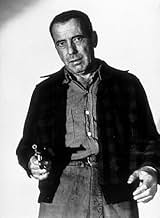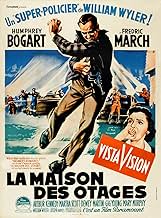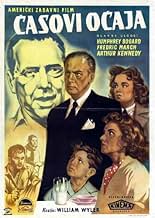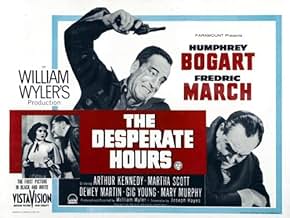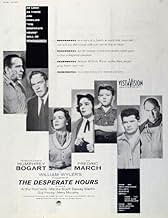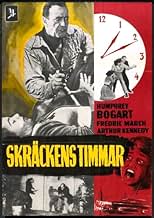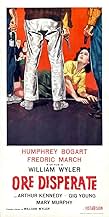Three escaped convicts move in on and terrorize a suburban household.Three escaped convicts move in on and terrorize a suburban household.Three escaped convicts move in on and terrorize a suburban household.
- Awards
- 2 wins & 1 nomination total
Walter Baldwin
- George Patterson
- (uncredited)
John Benson
- Bellboy
- (uncredited)
Paul E. Burns
- Chef at Al's Dining Room
- (uncredited)
Edmund Cobb
- Mr. Walling
- (uncredited)
Featured reviews
THE DESPERATE HOURS
Aspect ratio: 1.85:1 (VistaVision)
Sound format: Mono
(Black and white)
The patriarch of a middle-class suburban family (Fredric March) is forced to take action when they're held hostage in their own home by three escaped convicts, one of whom (Humphrey Bogart) is an experienced lifer with nothing to lose...
The first and only pairing of superstars Bogart and March is a tightly-wound thriller, written by Joseph Hayes (based on his novel and stageplay, inspired by actual events), and directed by Hollywood veteran William Wyler, distancing himself from the 'women's pictures' he had helped to popularize during the 1940's (THE LITTLE FOXES, MRS. MINIVER, THE HEIRESS etc.). Photographed in gleaming deep-focus VistaVision by Lee Garmes (SCARFACE, THE PARADINE CASE), the movie wrings incredible tension from the claustrophobic settings and frequent stand-offs between staunch family man March and embittered con Bogart. The movie's themes are fairly conservative and the outcome is never really in doubt, but this is a top-drawer thriller from Hollywood's 'golden age'. Also starring Arthur Kennedy, Martha Scott, Dewey Martin and Gig Young in crucial supporting roles. Unmissable.
NB. Though nowhere near as dreadful as most critics would have you believe, Michael Cimino's remake DESPERATE HOURS (1990) isn't a patch on the original.
Aspect ratio: 1.85:1 (VistaVision)
Sound format: Mono
(Black and white)
The patriarch of a middle-class suburban family (Fredric March) is forced to take action when they're held hostage in their own home by three escaped convicts, one of whom (Humphrey Bogart) is an experienced lifer with nothing to lose...
The first and only pairing of superstars Bogart and March is a tightly-wound thriller, written by Joseph Hayes (based on his novel and stageplay, inspired by actual events), and directed by Hollywood veteran William Wyler, distancing himself from the 'women's pictures' he had helped to popularize during the 1940's (THE LITTLE FOXES, MRS. MINIVER, THE HEIRESS etc.). Photographed in gleaming deep-focus VistaVision by Lee Garmes (SCARFACE, THE PARADINE CASE), the movie wrings incredible tension from the claustrophobic settings and frequent stand-offs between staunch family man March and embittered con Bogart. The movie's themes are fairly conservative and the outcome is never really in doubt, but this is a top-drawer thriller from Hollywood's 'golden age'. Also starring Arthur Kennedy, Martha Scott, Dewey Martin and Gig Young in crucial supporting roles. Unmissable.
NB. Though nowhere near as dreadful as most critics would have you believe, Michael Cimino's remake DESPERATE HOURS (1990) isn't a patch on the original.
The adaptation to the screen of Joseph Hayes' play by Mr. Hayes, himself, is given an excellent treatment by William Wyler, one of the great film directors of all times. The play was claustrophobic; there is little to be done in opening it and at times it feels as though we are in the theater watching the drama unfolds. Instead of detracting from it, this atmosphere contributes to the drama we are watching.
This film juxtaposes good and evil. We have the Hilliard household, which could be the set from anyone of the sitcoms of late 50s TV. There is the father figure, the decent Dan who is happily married to Eleonor and they have two children that seem to be their pride and joy.
Into this house a trio of escaped convicts arrive; they are ruthless. Led by Glenn Griffin, these desperate men bring panic to the Hilliards, who become paralyzed by the harm they might encounter at the hands of the criminals.
This film is a tribute to the great acting of Humphrey Bogart and Frederick March. Their characters are well defined and both actors play extremely well together. Mr. March was an accomplished actor of both the theater and the screen. Mr. Bogart holds his own against his co-star in a show of wills, unrivaled in any of the films of the 50s.
The cast assembled was first rate. Under Wyler's direction they give detailed performances. Martha Scott, Arthur Kennedy, Gig Young, Dewey Martin, among others, shine in this movie.
This film juxtaposes good and evil. We have the Hilliard household, which could be the set from anyone of the sitcoms of late 50s TV. There is the father figure, the decent Dan who is happily married to Eleonor and they have two children that seem to be their pride and joy.
Into this house a trio of escaped convicts arrive; they are ruthless. Led by Glenn Griffin, these desperate men bring panic to the Hilliards, who become paralyzed by the harm they might encounter at the hands of the criminals.
This film is a tribute to the great acting of Humphrey Bogart and Frederick March. Their characters are well defined and both actors play extremely well together. Mr. March was an accomplished actor of both the theater and the screen. Mr. Bogart holds his own against his co-star in a show of wills, unrivaled in any of the films of the 50s.
The cast assembled was first rate. Under Wyler's direction they give detailed performances. Martha Scott, Arthur Kennedy, Gig Young, Dewey Martin, among others, shine in this movie.
Humphrey Bogart got his first real notice on the silver screen in The Petrified Forest, repeating a role he did on Broadway. As Duke Mantee, criminal on the run, he held the occupants of a diner hostage for several hours.
Here in The Desperate Hours, Bogey takes over a role that Paul Newman originated on Broadway. Bogart, Dewey Martin and Robert Middleton play three escaped convicts who drive to Indianapolis because Bogart wants to kill the officer that arrested him. Dewey Martin is Bogart's younger brother and Robert Middleton is their brutal partner in the escape.
Given the age difference between Bogart and Paul Newman, I'm sure the role of Glenn Griffin was played quite differently by Newman on stage. Similarly Karl Malden played Dan Hilliard on stage and Fredric March plays him for the screen. March is no hero here, he's just an ordinary family man trapped with his family in a terrible situation.
Rounding out the Hilliard family is wife Martha Scott, daughter Mary Murphy and son Richard Eyer. Martha Scott had appeared with March before as his wife in One Foot in Heaven. She does well here also, but I do wonder where the real Mrs. March was, Florence Eldridge. It seems like a good joint project for both of them.
The Desperate Hours is a good suspenseful thriller that will keep you glued to your seat. These are real people here, not some Hollywood type situation comedy family. You will care about what the eventual outcome will be.
Here in The Desperate Hours, Bogey takes over a role that Paul Newman originated on Broadway. Bogart, Dewey Martin and Robert Middleton play three escaped convicts who drive to Indianapolis because Bogart wants to kill the officer that arrested him. Dewey Martin is Bogart's younger brother and Robert Middleton is their brutal partner in the escape.
Given the age difference between Bogart and Paul Newman, I'm sure the role of Glenn Griffin was played quite differently by Newman on stage. Similarly Karl Malden played Dan Hilliard on stage and Fredric March plays him for the screen. March is no hero here, he's just an ordinary family man trapped with his family in a terrible situation.
Rounding out the Hilliard family is wife Martha Scott, daughter Mary Murphy and son Richard Eyer. Martha Scott had appeared with March before as his wife in One Foot in Heaven. She does well here also, but I do wonder where the real Mrs. March was, Florence Eldridge. It seems like a good joint project for both of them.
The Desperate Hours is a good suspenseful thriller that will keep you glued to your seat. These are real people here, not some Hollywood type situation comedy family. You will care about what the eventual outcome will be.
Dan Hilliard and his family are perfect Americans, corresponding admirably to the bourgeois ideal. The two children are bright, good-looking and obedient. Cindy is about 20 and is going steady with an attorney who owns a sports car. Ralphy is eight or so, all plaid shirts, jeans and attitude. He has a baseball mitt and a bicycle. Ellie, Dan's wife, runs their spotless home with quiet efficiency. Everything is in its place. Trash collectors call at fixed times. Breakfast is a serene family ritual. The Hilliards' home life is as balanced, as regular and as dull as the barometer on the wall. As for Dan Hillier himself, he has attained that mythic status to which all 1950's bourgeois males aspired - he is an executive. The middle classes don't want adventure in their lives, they want predictability. And this is the perfect, dream-like state in which the Hilliards pass their anodyne existence, secure in their suburban womb - until the American Nightmare is unleashed upon them.
What if members of The Underclass, with their dirty, unshaven physicality and their sagging, torn clothes should irrupt into the suburbs? What if, by some catastrophic failure, the police and the prison service can't keep The Underclass in its designated containers? How will nice folks like the Hilliards cope if confronted by these alien beings?
There has been a jailbreak. The citizens of Indianapolis have been warned to watch out for three desperadoes - the two Griffin brothers and their accomplice Kobish. Little do the Hilliards realise as they go about their tranquil suburban lives, but the fugitives are about to choose the Hilliard home as a place to hole up ...
Like "Suddenly", made a year earlier, this is a 'bad guys invaded my home' movie. The downside of bourgeois affluence is the fear that the disenfranchised masses will come to take away your goodies.
Humphrey Bogart was in his late 50's and clearly ailing when he played the part of Glenn Griffin, the leader of the fugitive trio. He would make only two more films in the short time that was left to him. Dewey Martin, 26 years his junior, plays his kid brother Hal.
More than anything, "The Desperate Hours" is a film about social class. "You can't play ball with savages like that," opines a Madison County detective. Glenn holds his social superiors in equal contempt, calling them "smart-eyed respectable suckers". He warns Hal not to expect any favours from the class enemy: "Guys like Hilliard ever give you a fair shake?" Much play is made of linguistic markers which separate the educated from the rest ('whom' instead of 'who'), and contrasts in table manners between the refined Hilliards and their thuggish captors. Glenn lashes out against the tea tray, that emblem of middle-class gentility, and the virginal Cindy, whom he urges Hal to 'take'.
Dire though the Hilliards' predicament may be, they are not alone. They are exactly the kind of people the forces of law and order exist to protect and serve, and it is not long before Madison County's finest and the FBI are closing in on the fugitives. And the cops have science on their side. They can tap the phone of Glenn's girlfriend in Pittsburgh, and tail her across America as she heads for the rendezvous. In the police station, the humming wires never rest as technology narrows down the bad guys' options.
Middle-class sensibility is all-pervasive. Chuck and Cindy argue near the sports car, but break off abruptly when two people pass by. No matter how deeply the emotions may run, it isn't seemly to fight in front of the neighbours. Dan's secretary can tell, from nuances of his behaviour, that something is very wrong. Similarly, the trashman senses that things are amiss with Ellie by the quality of her chat. We see Cindy admiring her curves in front of the hallway mirror, because it is important that she be sexually desirable (so that the fugitives will regard her as a chattle). Chuck, however, has to remain sexually thwarted, because his behaviour is bound by rigid bourgeois restrictions. We see him raise the arm-rest in his sports car in the hope of a grappling session with Cindy, then lowering it dejectedly when he realises that his luck is out. Dan's wave to Chuck to cross the threshold is a symbolic acceptance of him as a son-in-law. He has made it into The Family.
Light represents goodness. Cindy comes home after another chaste date with Chuck and is bathed in bright light on the doorstep. Dan and Ellie declare their love for each other, their bodies lit intensely in an otherwise black bedroom. The searchlights of the police, and the bad guys' vain attempts to eradicate them, show us figuratively what we yearn to see - that good will always triumph over social disruption.
The overpowering of Ellie, the smashing of Ralphy's toy plane and the collapse of Cindy all happen on the same spot and are all filmed from the same low angle. These dramatic incidents show the Hilliards at bay, and the unusual vantage-point stresses the 'wrongness' of what is happening.
Implausibilities abound throughout the movie. How likely is it that the front door would be left unlocked, that Chuck would reach the house ahead of the cops, or that Dan would insist on carrying a gun, then empty its clip? Why would he hesitate to call the police in, once he got the upper hand? Why would everyone leave the family unattended, moments after the conclusion of a violent and dramatic siege?
And yet it works. Glenn's love of his brother breaks through his tough-guy facade, and after he gives his guns away he undergoes a tragic 'King Lear' moment of self-realisation. These are powerful moments in a powerful film.
What if members of The Underclass, with their dirty, unshaven physicality and their sagging, torn clothes should irrupt into the suburbs? What if, by some catastrophic failure, the police and the prison service can't keep The Underclass in its designated containers? How will nice folks like the Hilliards cope if confronted by these alien beings?
There has been a jailbreak. The citizens of Indianapolis have been warned to watch out for three desperadoes - the two Griffin brothers and their accomplice Kobish. Little do the Hilliards realise as they go about their tranquil suburban lives, but the fugitives are about to choose the Hilliard home as a place to hole up ...
Like "Suddenly", made a year earlier, this is a 'bad guys invaded my home' movie. The downside of bourgeois affluence is the fear that the disenfranchised masses will come to take away your goodies.
Humphrey Bogart was in his late 50's and clearly ailing when he played the part of Glenn Griffin, the leader of the fugitive trio. He would make only two more films in the short time that was left to him. Dewey Martin, 26 years his junior, plays his kid brother Hal.
More than anything, "The Desperate Hours" is a film about social class. "You can't play ball with savages like that," opines a Madison County detective. Glenn holds his social superiors in equal contempt, calling them "smart-eyed respectable suckers". He warns Hal not to expect any favours from the class enemy: "Guys like Hilliard ever give you a fair shake?" Much play is made of linguistic markers which separate the educated from the rest ('whom' instead of 'who'), and contrasts in table manners between the refined Hilliards and their thuggish captors. Glenn lashes out against the tea tray, that emblem of middle-class gentility, and the virginal Cindy, whom he urges Hal to 'take'.
Dire though the Hilliards' predicament may be, they are not alone. They are exactly the kind of people the forces of law and order exist to protect and serve, and it is not long before Madison County's finest and the FBI are closing in on the fugitives. And the cops have science on their side. They can tap the phone of Glenn's girlfriend in Pittsburgh, and tail her across America as she heads for the rendezvous. In the police station, the humming wires never rest as technology narrows down the bad guys' options.
Middle-class sensibility is all-pervasive. Chuck and Cindy argue near the sports car, but break off abruptly when two people pass by. No matter how deeply the emotions may run, it isn't seemly to fight in front of the neighbours. Dan's secretary can tell, from nuances of his behaviour, that something is very wrong. Similarly, the trashman senses that things are amiss with Ellie by the quality of her chat. We see Cindy admiring her curves in front of the hallway mirror, because it is important that she be sexually desirable (so that the fugitives will regard her as a chattle). Chuck, however, has to remain sexually thwarted, because his behaviour is bound by rigid bourgeois restrictions. We see him raise the arm-rest in his sports car in the hope of a grappling session with Cindy, then lowering it dejectedly when he realises that his luck is out. Dan's wave to Chuck to cross the threshold is a symbolic acceptance of him as a son-in-law. He has made it into The Family.
Light represents goodness. Cindy comes home after another chaste date with Chuck and is bathed in bright light on the doorstep. Dan and Ellie declare their love for each other, their bodies lit intensely in an otherwise black bedroom. The searchlights of the police, and the bad guys' vain attempts to eradicate them, show us figuratively what we yearn to see - that good will always triumph over social disruption.
The overpowering of Ellie, the smashing of Ralphy's toy plane and the collapse of Cindy all happen on the same spot and are all filmed from the same low angle. These dramatic incidents show the Hilliards at bay, and the unusual vantage-point stresses the 'wrongness' of what is happening.
Implausibilities abound throughout the movie. How likely is it that the front door would be left unlocked, that Chuck would reach the house ahead of the cops, or that Dan would insist on carrying a gun, then empty its clip? Why would he hesitate to call the police in, once he got the upper hand? Why would everyone leave the family unattended, moments after the conclusion of a violent and dramatic siege?
And yet it works. Glenn's love of his brother breaks through his tough-guy facade, and after he gives his guns away he undergoes a tragic 'King Lear' moment of self-realisation. These are powerful moments in a powerful film.
These are the times when danger looks us in the face, when terror, torment, tyranny lends an embrace, as all we cherish and endear, goes toe to toe with every fear, and the world that was secure, falls out of place. When every movement of the clock is an attack, facades of life engraved with fractures, widened cracks - tremors, trembles, quaking dread, in not too long, you might be dead, as the desperation reaches, a climax.
It's of its time but it does still stand up to be counted all these years later, with superb performances throughout, especially HB, who as an actor matured with magnificence in the latter years of his movie making career.
It's of its time but it does still stand up to be counted all these years later, with superb performances throughout, especially HB, who as an actor matured with magnificence in the latter years of his movie making career.
Did you know
- TriviaThe character of Glenn Griffin was made older so Humphrey Bogart could play the role. The stage version starred Karl Malden and a young Paul Newman in the Bogart role.
- GoofsBefore Glenn asks Eleanor if she could make a phone call without crying, he puts his left hand in his pocket. When she stands up and walks to the phone, he puts the same hand in the pocket again.
- Quotes
[first lines]
[the morning newspaper hits the front door]
Ellie Hilliard: I'll get it, darling.
Daniel Hilliard: [about the newspaper boy's routine of always hitting the front door with the newspaper] Some morning I'm gonna catch up with that kid.
- How long is The Desperate Hours?Powered by Alexa
Details
- Release date
- Country of origin
- Language
- Also known as
- Casovi ocaja
- Filming locations
- Production company
- See more company credits at IMDbPro
Box office
- Budget
- $2,388,000 (estimated)
- Runtime1 hour 52 minutes
- Color
- Aspect ratio
- 1.37 : 1(original ratio)
Contribute to this page
Suggest an edit or add missing content



